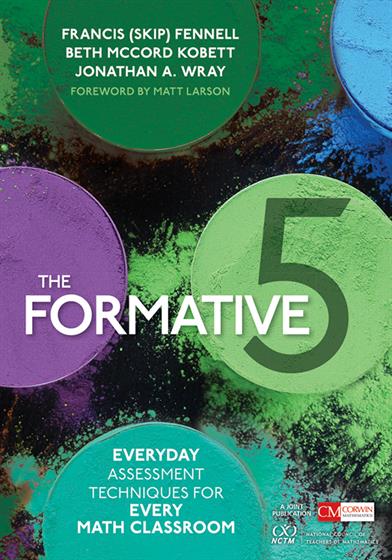Hands-on, Practical Guidance for Educators
From math,
literacy, science, equity, multilingual learners, and SEL, to assessment, school counseling,
and education leadership, our books are research-based and authored by experts
on topics most relevant to what educators are facing today.

The Formative 5
Foreword by Matt Larson
- Grade Level: PreK-12
- ISBN: 9781506337500
- Published By: Corwin
- Series: Corwin Mathematics Series
- Year: 2017
- Page Count: 200
- Publication date: December 19, 2016
Review Copies
Review copies may be requested by individuals planning to purchase 10 or more copies for a team or considering a book for adoption in a higher ed course. Request review copy
Description
“This highly practical and readable book gets right down into the detail of what good formative assessment looks like in math classrooms, and shows how teachers can make this a part of their regular planning and instruction.”
—Dylan Wiliam, Emeritus Professor of Educational Assessment, University College
Imagine how it would feel to not worry about how to plan, teach, and check for student mathematical understandings and related proficiencies. Imagine if this important process felt like a natural, every day, part of your lesson preparation instead of an extra thing to do. This must-have resource shows the way.
NCTM Past President, Francis “Skip” Fennell, and nationally-recognized mathematics educators Beth McCord Kobett and Jonathan (Jon) Wray, offer five of the most impactful, proven assessment techniques—Observations, Interviews, “Show Me,” Hinge Questions, and Exit Tasks— you can implement, every day. Tried and tested by teachers just like you, you’ll find that this palette of classroom-based techniques will truly assess learning and inform teaching.
Research and classroom practice indicates that formative assessment is poorly understood. This book gives you a concise, research-based, classroom-dedicated plan with lots of tools, activities, classroom vignettes, and student work to guide your daily use of these techniques – The Formative 5.
Both within and between lessons, K-8 teachers of mathematics will learn to
- Think and go beyond assessment of learning, focusing on assessment for learning
- Directly connect assessment to planning and teaching
- Engineer effective classroom questioning, discussions, and learning tasks
- Provide success criteria and feedback that moves students forward
- Integrate the Standards for Mathematical Practice
- Activate student self-assessors who take ownership of their learning
Includes a book study guide, tools and templates, and a companion website with downloadables and multi-media examples of student discussion in the classroom. The Formative 5 will help you build your mathematics-related formative assessment capacity through daily use of these five key techniques, leading to regularly monitored and improved learning opportunities for your students.
Now Available: The On-Your-Feet Guide to The Formative 5
Key features
Includes:
- Companion website with 15+ downloadable tools, templates, and checklists in PDF and Word format
- Video and audio examples of student discussion in real classrooms
- Student work, teacher reflections and quotes, teachers’ FAQs
- Online book study guide
Author(s)

Francis (Skip) Fennell
Francis (Skip) Fennell is professor of education and Graduate and Professional Studies, emeritus at McDaniel College in Maryland. He is a former classroom teacher, principal, and supervisor of instruction, and past president of the Association of Mathematics Teacher Educators (AMTE), the Research Council on Mathematics Learning (RCML), and the National Council of Teachers of Mathematics (NCTM). He is a recipient of the Mathematics Educator of the Year Award from the Maryland Council of Teachers of Mathematics (MCTM), the Glenn Gilbert National Leadership Award from NCSM: Leadership in Mathematics Education, the Excellence in Leadership and Service in Mathematics Teacher Education Award from AMTE, the James Heddens Distinguished Service Award from RCML, and Lifetime Achievement Awards from both MCTM and NCTM. Skip’s many publications including Achieving Fluency: Special Education and Mathematics (NCTM, 2011), and The Formative 5: In Action (Corwin, 2024) have been influenced by his classroom experiences and decades long focus on assessment, number sense, fractions, elementary mathematics specialists and teacher education.

Beth McCord Kobett
Beth McCord Kobett serves as Professor and Dean in the School of Education at Stevenson University, where she works closely with early childhood, elementary, and middle school preservice teachers. She brings experience as a classroom teacher, mathematics specialist, and university supervisor. Beth served on the NCTM Board and served as president of Association of Maryland Mathematics Teacher Educators. Beth has authored ten mathematics education books and supports professional learning efforts nationwide. She has been honored with awards such as the MCTM Mathematics Educator of the Year and Stevenson’s Rose Dawson Award for Excellence in Teaching. Deeply committed to her students, she strives to create a supportive, strengths-based learning environment that fosters curiosity, collaboration, and meaningful growth.
Table of Contents
Foreword
About the Authors
Preface
Acknowledgments
PART I Getting Started
WHY FORMATIVE ASSESSMENT? ISSUES AND OPPORTUNITIES
Assessment Literacy: What Is It? Why Is This Important?
Formative/Summative: It’s All Testing, Right?
Formative Assessment: Assessing to Inform
Classroom-Based Formative Assessment: Why Is This Important? You Do Have the Time to Do This!
Formative Assessment in YOUR Classroom: The Classroom Is Your Canvas!
Summing Up
Professional Learning Discussion Questions
PART II The Formative 5
CHAPTER 1 OBSERVATIONS
Observations: Background and Basics
Planning for Observations
Tools for Using Observations in the Classroom
Technology Tips and Tools for Recording Observations
Using Observations in YOUR Classroom
Summing Up
Professional Learning Discussion Questions
CHAPTER 2 INTERVIEWS
Interviews: Background and Basics
Planning for the Interview
Tools for Using Interviews in the Classroom
Technology Tips and Tools for Recording Interviews
Using Interviews in YOUR Classroom
Summing Up
Professional Learning Discussion Questions
CHAPTER 3 SHOW ME
Show Me: Background and Basics
Planning for Show Me
Tools for Using Show Me in the Classroom
Technology Tips and Tools for Recording Show Me Responses
Using Show Me in YOUR Classroom
Summing Up
Professional Learning Discussion Questions
CHAPTER 4 HINGE QUESTIONS
Hinge Questions: Background and Basics
Planning for Using Hinge Questions
Tools for Using Hinge Questions in the Classroom
Technology Tips and Tools for Recording Hinge Questions
Using Hinge Questions in YOUR Classroom
Summing Up
Professional Learning Discussion Questions
CHAPTER 5 EXIT TASKS
Exit Tasks: Background and Basics
Planning for Using Exit Tasks
Tools for Using Exit Tasks in the Classroom
Technology Tools and Tips for Exit Tasks
Using Exit Tasks in YOUR Classroom
Summing Up
Professional Learning Discussion Questions
PART III Next Steps
CHAPTER 6 IT’S YOUR TURN!
Why Formative Assessment? Issues and Opportunities
Chapter 1: Observations
Chapter 2: Interviews
Chapter 3: Show Me
Chapter 4: Hinge Questions
Chapter 5: Exit Tasks
What’s Next?
Appendix: Book Study Guide
References
Index
Reviews
“We know that regular use of formative assessment is an essential part of effective instruction, but we know far less about how to help teachers make this a reality in their classrooms. In this highly practical and readable book, Fennell, Kobett, and Wray get right down into the detail of what good formative assessment looks like in math classrooms, and show how teachers can make this a part of their regular planning and instruction. They also include the voices of real teachers, the challenges they faced in taking these ideas on board, and the way that they have taken the basic ideas of formative assessment and made them a living reality in their classrooms. This is a “must-read” book for anyone who teaches math.”
Dylan Wiliam, Emeritus Professor of Educational Assessment“We know that regular use of formative assessment is an essential part of effective instruction, but we know far less about how to help teachers make this a reality in their classrooms. In this highly practical and readable book, Fennell, Kobett, and Wray get right down into the detail of what good formative assessment looks like in math classrooms, and show how teachers can make this a part of their regular planning and instruction. They also include the voices of real teachers, the challenges they faced in taking these ideas on board, and the way that they have taken the basic ideas of formative assessment and made them a living reality in their classrooms. This is a “must-read” book for anyone who teaches math.”
University College London
“This book is a gem. Fennell, Kobett, and Wray don’t just provide advice on what to do; they provide you the tools you need to implement specific formative assessment techniques in your classroom.”
Matt Larson, President“This book is a gem. Fennell, Kobett, and Wray don’t just provide advice on what to do; they provide you the tools you need to implement specific formative assessment techniques in your classroom.”
National Council of Teachers of Mathematics
“The Formative 5 could be added to the list of ‘Fab 5s’—each of the chapters provides fabulous examples, tools, and discussion for implementing a comprehensive formative plan in your classroom. A valuable resource for individual use, collaborative learning communities, book study, and lesson study—beneficial to preservice teachers through master teachers.”
Jennifer M. Bay-Williams, Mathematics Teacher Educator“The Formative 5 could be added to the list of ‘Fab 5s’—each of the chapters provides fabulous examples, tools, and discussion for implementing a comprehensive formative plan in your classroom. A valuable resource for individual use, collaborative learning communities, book study, and lesson study—beneficial to preservice teachers through master teachers.”
University of Louisville
“Formative assessment is an invaluable way to learn about students’ mathematical understandings and to guide instruction that focuses on student needs rather than on content. In The Formative 5, Fennell, Kobett, and Wray share five powerful protocols that help teachers embed formative assessment in daily instruction and how—when used individually or together—they guide next instructional moves. A great resource for every math teacher!”
Linda Gojak, Past President“Formative assessment is an invaluable way to learn about students’ mathematical understandings and to guide instruction that focuses on student needs rather than on content. In The Formative 5, Fennell, Kobett, and Wray share five powerful protocols that help teachers embed formative assessment in daily instruction and how—when used individually or together—they guide next instructional moves. A great resource for every math teacher!”
National Council of Teachers of Mathematics and author of The Common Core Mathematics Companions, grades K-2 and 3-5
“This book is so valuable because it gives the techniques that can help build formative assessments for any mathematical content, at any grade, for any learner. There are actual vignettes of classroom instruction and the stories from the field bring the material alive and provide testimony to the book’s ultimate effectiveness.”
Karen Karp, Visiting Professor“This book is so valuable because it gives the techniques that can help build formative assessments for any mathematical content, at any grade, for any learner. There are actual vignettes of classroom instruction and the stories from the field bring the material alive and provide testimony to the book’s ultimate effectiveness.”
School of Education, Johns Hopkins University
“The authors take the mystery out of formative assessment by providing a set of concrete strategies, rich grade-level examples that bring the strategies to life, and a set of tools to help teachers plan for and implement the strategies in the classroom. The Formative 5 provides a powerful way of seamlessly linking assessment and instruction. A must have for K-8 mathematics teachers!”
Margaret S. Smith, Co-Author“The authors take the mystery out of formative assessment by providing a set of concrete strategies, rich grade-level examples that bring the strategies to life, and a set of tools to help teachers plan for and implement the strategies in the classroom. The Formative 5 provides a powerful way of seamlessly linking assessment and instruction. A must have for K-8 mathematics teachers!”
University of Pittsburgh & Co-Author of 5 Practices for Orchestrating Productive Mathematics Discussions
"The Formative 5: Everyday Assessment Techniques for Every Math Classroom is a much needed practical resource that will help teachers understand and be able to use formative assessment on a daily basis. The book suggests powerful techniques and tools for monitoring and impacting student learning. The well-crafted examples and student work samples are incredibly useful."Ruth Harbin Miles, Author
Former K–12 Supervisor of Mathematics, Olathe District Schools & Author of The Common Core Mathematics Companions, Grades K–2, 3–5, and 6–8
“Formative assessment is one of the most effective, but poorly understood, instructional approaches. This useful book clarifies formative assessment and provides the tools teachers need to put it into practice. As we describe the ‘formative years’ as having a deep and lasting effect on children’s development, formative assessment seen as a core teaching strategy can have a profound and permanent effect on teachers’ practice and their students’ learning. The Formative 5 will help educators do just that.”
Douglas H. Clements, Executive Director“Formative assessment is one of the most effective, but poorly understood, instructional approaches. This useful book clarifies formative assessment and provides the tools teachers need to put it into practice. As we describe the ‘formative years’ as having a deep and lasting effect on children’s development, formative assessment seen as a core teaching strategy can have a profound and permanent effect on teachers’ practice and their students’ learning. The Formative 5 will help educators do just that.”
Marsico Institute for Early Learning and Literacy
“This book meets teachers where they are by providing immediately implementable, practical advice for formatively assessing students. These are not theoretical ideas as they come from the experiences of three authors who have been using and refining these techniques for years.”
Robert Kaplinsky, Math Teacher Specialist“This book meets teachers where they are by providing immediately implementable, practical advice for formatively assessing students. These are not theoretical ideas as they come from the experiences of three authors who have been using and refining these techniques for years.”
Downey Unified School District, Downey, CA
“The Formative Five outlines the best way to seamlessly intertwine formative assessment, lesson planning, and instruction for all grade levels. Using five practical formative assessment strategies, this resource supports teachers as they build a comprehensive picture of every student’s mathematical understandings and misconceptions. Definitely, a must-have resource for all mathematics classrooms!”
Sherry Parrish, Author“The Formative Five outlines the best way to seamlessly intertwine formative assessment, lesson planning, and instruction for all grade levels. Using five practical formative assessment strategies, this resource supports teachers as they build a comprehensive picture of every student’s mathematical understandings and misconceptions. Definitely, a must-have resource for all mathematics classrooms!”
Author of Number Talks: Whole Number Computation and Number Talks: Fractions, Decimals, and Percentages
“The Formative Five will not only help teachers deepen their understanding of formative assessment, but it provides them with concrete tools to implement each of the five formative assessment techniques to move students’ learning forward. Through their wealth of experiences working with teachers, students, and leaders, the authors have grounded their guidance in examples and vignettes that allow readers to ‘see’ how the techniques can be implemented in classrooms, making the book very accessible. I look forward to using it with both in-service and pre-service teachers with whom I work.”
Robert Q. Berry, III, Ph.D., Associate Professor“The Formative Five will not only help teachers deepen their understanding of formative assessment, but it provides them with concrete tools to implement each of the five formative assessment techniques to move students’ learning forward. Through their wealth of experiences working with teachers, students, and leaders, the authors have grounded their guidance in examples and vignettes that allow readers to ‘see’ how the techniques can be implemented in classrooms, making the book very accessible. I look forward to using it with both in-service and pre-service teachers with whom I work.”
Curry School of Education, University of Virginia & President-Elect, National Council of Teachers of Mathematics
“A great resource for math educators! The easy to read format, practical suggestions, and ready-to-use tools give teachers what they need to engage in their own professional learning. I am also excited about the potential impact on teaching and learning for those leaders in our district who take the time to use this resource during their professional learning experiences.”
Christopher R. Horne, Ph.D., Curriculum Specialist for Elementary Mathematics“A great resource for math educators! The easy to read format, practical suggestions, and ready-to-use tools give teachers what they need to engage in their own professional learning. I am also excited about the potential impact on teaching and learning for those leaders in our district who take the time to use this resource during their professional learning experiences.”
Frederick County Public Schools
“I am so excited about integrating The Formative Five into our district’s ongoing work with formative assessment. This practitioner friendly resource provides math educators 5 ready to use formative assessment techniques complete with planning tools, examples and many other useful resources that our district’s professional learning communities will use as we continue our work in the teaching and learning of mathematics.”
Angela Waltrup, Content Specialist, Elementary Mathematics,“I am so excited about integrating The Formative Five into our district’s ongoing work with formative assessment. This practitioner friendly resource provides math educators 5 ready to use formative assessment techniques complete with planning tools, examples and many other useful resources that our district’s professional learning communities will use as we continue our work in the teaching and learning of mathematics.”
Washington County Public Schools, MD
“The Formative 5 explains why formative assessment is the lifeblood of all good instruction and then provides practical strategies that teachers can start using tomorrow. Fennell, Kobett, and Wray have given math teachers the best sort of gift—one that serves their students.”Eric Westendorf, Co-founder & CEO
LearnZillion
“The Formative 5 is easy to read and full of specific assessment strategies that can stand alone or be used in concert. The ideas outlined in this book can be used on a daily basis to inform instructional decision making. The grade level examples of each of the assessment strategies, video examples, and professional learning discussion questions are perfect for use in a pre-service teacher education program, in service professional learning environment, or school-based PLC.”
Kyndall Brown, Executive Director“The Formative 5 is easy to read and full of specific assessment strategies that can stand alone or be used in concert. The ideas outlined in this book can be used on a daily basis to inform instructional decision making. The grade level examples of each of the assessment strategies, video examples, and professional learning discussion questions are perfect for use in a pre-service teacher education program, in service professional learning environment, or school-based PLC.”
California Mathematics Project, UCLA
Review Copies
Review copies may be requested by individuals planning to purchase 10 or more copies for a team or considering a book for adoption in a higher ed course. Request review copy
Related Resources
- Access to companion resources is available with the purchase of this book.
-
Classroom Observation Checklist
[Checklists and Assessments] -
Hinge Question Implementation Tool
[Lessons and Strategies]
Join us for the Visible Learning
Conference in Las Vegas!
Experience groundbreaking research, inspiring speakers,
and transformative networking. Register Now.


